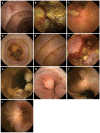Capsule endoscopy: current practice and future directions
- PMID: 24976712
- PMCID: PMC4069303
- DOI: 10.3748/wjg.v20.i24.7752
Capsule endoscopy: current practice and future directions
Abstract
Capsule endoscopy (CE) has transformed investigation of the small bowel providing a non-invasive, well tolerated means of accurately visualising the distal duodenum, jejunum and ileum. Since the introduction of small bowel CE thirteen years ago a high volume of literature on indications, diagnostic yields and safety profile has been presented. Inclusion in national and international guidelines has placed small bowel capsule endoscopy at the forefront of investigation into suspected diseases of the small bowel. Most commonly, small bowel CE is used in patients with suspected bleeding or to identify evidence of active Crohn's disease (CD) (in patients with or without a prior history of CD). Typically, CE is undertaken after upper and lower gastrointestinal flexible endoscopy has failed to identify a diagnosis. Small bowel radiology or a patency capsule test should be considered prior to CE in those at high risk of strictures (such as patients known to have CD or presenting with obstructive symptoms) to reduce the risk of capsule retention. CE also has a role in patients with coeliac disease, suspected small bowel tumours and other small bowel disorders. Since the advent of small bowel CE, dedicated oesophageal and colon capsule endoscopes have expanded the fields of application to include the investigation of upper and lower gastrointestinal disorders. Oesophageal CE may be used to diagnose oesophagitis, Barrett's oesophagus and varices but reliability in identifying gastroduodenal pathology is unknown and it does not have biopsy capability. Colon CE provides an alternative to conventional colonoscopy for symptomatic patients, while a possible role in colorectal cancer screening is a fascinating prospect. Current research is already addressing the possibility of controlling capsule movement and developing capsules which allow tissue sampling and the administration of therapy.
Keywords: Capsule endoscopy; Colon; Indications; Oesophageal; Small bowel; Technology.
Figures

References
-
- Ho KK, Joyce AM. Complications of capsule endoscopy. Gastrointest Endosc Clin N Am. 2007;17:169–178, viii-ix. - PubMed
-
- Liao Z, Gao R, Xu C, Li ZS. Indications and detection, completion, and retention rates of small-bowel capsule endoscopy: a systematic review. Gastrointest Endosc. 2010;71:280–286. - PubMed
-
- Carey EJ, Heigh RI, Fleischer DE. Endoscopic capsule endoscope delivery for patients with dysphagia, anatomical abnormalities, or gastroparesis. Gastrointest Endosc. 2004;59:423–426. - PubMed
-
- Cheifetz AS, Lewis BS. Capsule endoscopy retention: is it a complication? J Clin Gastroenterol. 2006;40:688–691. - PubMed
Publication types
MeSH terms
LinkOut - more resources
Full Text Sources
Other Literature Sources
Medical

